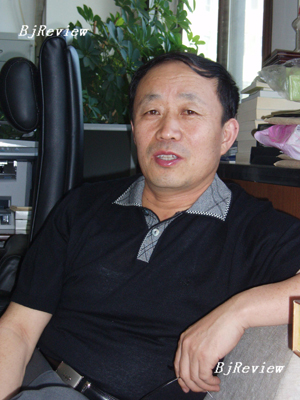China’s painful memories of famine will hopefully act as deterrent to another such catastrophe
Food security is an important factor in non-traditional security concerns. Does China have food shortage concerns? How should China guarantee its food security? Beijing Review reporter Feng Jianhua discusses these issues with Professor Li Chenggui, head of the Center for Rural Policy under the Chinese Academy of Social Sciences, and Yang Shaopin, Director of the Bureau of State Farms and Land Reclamation under the Ministry of Agriculture.
Beijing Review: At a national conference of grain bureau chiefs at the end of January, Nie Zhenbang, Director of State Grain Administration, said that steady growth of China’s national grain reserves means the nation’s food security is completely guaranteed. Meanwhile, many grain experts think China’s total grain demand will rise steadily for the next 15 years, leading to a shortfall in supply. Such a scenario poses serious challenges to China’s farming industry. What is your opinion?
Li Chenggui: I am optimistic about China’s grain balance. China has painful memories about famine. Under this kind of social psyche, pressure on China’s grain supply tends to be exaggerated, which often triggers public concerns as well as those of the government. Fluctuations of grain supply in the international market are normal. Yet if these fluctuations concern China, any delay in government response is likely to cause large-scale social panic. This phenomenon is linked with Chinese national conditions, which is quite understandable.
"My basic judgment is that I don't believe famine will ever befall China."
---Li Chenggui
As a matter of fact, China’s grain concerns have been overstressed. About 10 years ago, the United Nations Food and Agriculture Organization recommended a food security requirement level of more than 400 kg per capita a year. Many people calculate China’s total grain demand based on this standard and compare the result with the predicted total production capacity. These experts project a grain crisis for China based on any gap between these two figures. This is a very simple academic assumption.
In fact, this per-capita grain requirement is far from China’s situation considering the changed population scale, land resources and consumption models. My basic judgment is that I don’t believe famine will ever befall China.
According to statistics, between 1986 and 2005, China’s farmland has receded by 17.7 million hectares in total to construction land use. The annual loss of agricultural land is around 0.5 percent. This farmland withdrawal has become an irreversible trend. Many people worry that the benchmark line put forward by the State Council of having 120 million hectares of farmland by 2020 will not be achieved. Farmland, a key factor of agriculture, is the basis for grain supply. Some people believe this decrease in farmland is the biggest threat to food security. What do you think?
Li Chenggui: I believe the drop in farmland is an unavoidable trend with the accelerated industrialization and urbanization of China. Therefore, it is impossible to defend the benchmark line of 120 million hectares forever. We should admit that the drop of farmland is a major minus for steady grain supply in China. While this factor should be given attention, we should not be over pessimistic due to the following factors.
Firstly, besides the policy of strictly forbidding the loss of farmland, China has huge potential to tapping farmland resources. For example, I recently did field studies in the Xinjiang Uygur Autonomous Region and was told there are about 1.3 million hectares of reclaimable land in this region.
Secondly, there is enormous space for output increase based on technological progress. In my recent field research in China’s northeast, I found that 80 percent of farmers in that region plant soybeans. But the quality of their products is poor with small seeds of low oil production. If new technologies could be introduced, the output would experience a big hike. I personally believe that with proper state guidance and enough market demand, China’s grain production will reach another peak.
What is your biggest worry about China’s food security?
Li Chenggui: My biggest worry is whether agricultural technology can catch up with the speed of social and economic development. Agriculture is a resource-intensive industry. Thus when there are bottlenecks for resource supply, agricultural development largely hinges on the progress of technology. Although China’s grain production per unit is higher than the world average level, it lags behind that of developed countries.
Among major grain varieties, China only enjoys advantages in wheat production. In 2005, China’s wheat production per hectare was 4.23 tons, much higher than the 2.82 tons of the United States and a little above Japan’s 4.11 tons. However, in the same year China’s rice production per hectare was 6.26 tons, way below the United States’ 7.44 tons; China’s corn production per hectare was 5.15 tons, around 55 percent of the United States’ 9.29 tons; soybean production per hectare was 1.83 tons, far behind the 2.91 tons of the United States.
The first standard of a country’s food security put forward by the United Nations Food and Agriculture Organization is a self-sufficiency rate of 95 percent or above. What is the situation for China?
Li Chenggui: China is able to supply 95 percent of its grain demand. But many people have clung to the mistaken idea of singularly pursuing the self-sufficiency rate: the higher the better.
I believe China should adjust its strategies and advocate food security based on efficiency. The one-sided emphasis on grain self-sufficiency regardless of the cost will damage national interests. For example, some areas have transformed grassland into farmland only to raise grain self-sufficiency in that region. The result was that grain output only experienced a limited increase while the local eco-system was disastrously damaged.
China’s food security is based on the domestic supply of grain. However, the Chinese Government should be flexible on macro-control of grain self-sufficiency. China should skillfully take advantage of the international market. The decline of farmland and shortage of water are two outstanding factors adversely affecting China’s food security. According to statistics, due to low irrigation water use, the production of 1 kg of grain consumes 2 tons of water, which is three times the level of industrial countries.
In order to guarantee China’s food security, China has established large commercial grain production bases. Among these production bases, a major type is state farms, including mega-farms operated by the Central Government. For example, the reclamation area of Heilongjiang Province in China’s northeast has become an important grain production base and strategic grain reserve. As an official in charge of land reclamation and state farms, what do you think of the role of land reclamation areas in guaranteeing China’s food security?
Yang Shaopin: Every province on the Chinese mainland has its land reclamation zone and there are three land reclamation zones directly under the administration of the Central Government, located in China’s northeast province of Heilongjiang, southern province of Guangdong and island province of Hainan. When China established these land reclamation zones, an important goal was to ensure grain supply for big cities.
"In 2006, the reclamation area in Heilongjiang Province produced a total of 6.66 billion kg, which is enough to sustain the total population in the four municipalities of Beijing, Shanghai, Tianjin and Chongqing and all Chinese army soldiers for one year."
---Yang Shaopin
The total area of these land reclamation zones is 375,000 square km, equivalent to that of a big province. They have a total of 5 million hectares of farmland. In 2006, land reclamation zones all over China produced less than 5 percent of the country’s total grain production. Despite the low proportion in the total production, these land reclamation areas, especially mega land reclamation zones, play a vital role in maintaining the country’s food security. For example, during the outbreak of the severe acute respiratory syndrome epidemic in 2003, Beijing was hit by a panic purchase of food. Under such circumstances, Central Government ordered delivery of a large amount of grain from the Heilongjiang land reclamation area to Beijing, which immediately curbed the panic.
In many areas of China, farmers mainly plant grain for their own needs. Land reclamation areas have large commercial farms whose commercial production accounts for 85 percent of their total production. In 2006, the reclamation area in Heilongjiang Province produced a total of 6.66 billion kg, which is enough to sustain the total population in the four municipalities of Beijing, Shanghai, Tianjin and Chongqing and all Chinese army soldiers for one year. In the past five years, the land reclamation area in Heilongjiang sold more than 45 billion kg of grain to the country. These figures are evidence that large land reclamation areas are playing a key role in maintaining national food security.
To maintain food security it is important to avoid serious fluctuations in total output. Several years ago the food security issue was given unprecedented attention, which caused a large-scale surplus in grain supply. Grain can mold after being stored for many years. How do we avoid a recurrence of this situation?
Li Chenggui: The supply of grain is greatly affected by psychological factors. Therefore, the Chinese Government should keep itself on high alert while easing the worries of the public. To be specific, in the case of a fluctuation in the market, the government needs to minimize the effect using macro-control tools rather than encourage people to overreact. Thus the National Development and Reform Commission should keep a clear mind about overall grain demand and supply and make correct predictions about grain supply and demand in domestic and international markets.
Several years ago, spurred by the grain surplus, some government departments offered incentives to enterprises producing ethanol out of corn. This shortsighted policy has been stopped recently. Aside from cost factors, this policy will bring damage to stable grain supply in China.
Since China joined the WTO in 2001, Chinese agriculture has faced a globalized market. What impact has this had on maintaining food security?
Li Chenggui: From the perspective of maintaining national food security, China’s accession to the WTO is a positive factor since China has more choices of market channels. However, this has harmed farmers’ enthusiasm for cultivation since agricultural products from Western industrial countries are more competitive due to their advantage of low costs.
As the world economy has walked to a globalized one, any fluctuation in grain supply in the most populous country will affect the whole international market. Therefore, to dismiss worries of the international community, China has to trade with more import partners, such as Brazil and Australia, and sign more forward contracts so as to avoid purchasing grain of a colossal amount in a short period of time. This can minimize its impact on the international grain market.
(Beijing Review June 29, 2007)


